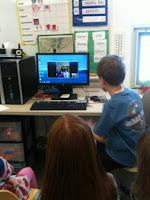Letter Writing Part 2
link to published article
link to article- part one
In this time when school securities are threatened by unmitigated attacks, technology in education serves to open campuses between distant communities. A recent pen pal project entered a second phase of practice with letter writing and Skype. It has served to distract us from tragedy and fears of being able to engage in meaningful, safe dialogue.
Last week Flatdaddy and I facilitated a follow up session with the classroom to classroom Skype between New Mexico and Vermont . Our first chat gave students an opportunity to see the face of their pen pal. Each class enjoyed watching each other hear ideas and evidence pulled from past letters and visually seeing each other respond to questions comparing culture and geography. Our follow up chat would give students three minutes to converse with a penpal. Management was discussed and planned ahead of time with the decision to model a structured conversation deliberately related to Common Core standards. What did they learn about their pen pal or their state from the previous letters? What do they hope their pen pal will write about in the next letter? We established five small group sessions with set amounts of time. Teachers kept the class occupied in a lab while the smaller groups congregated around a computer in a separate room. I acted as one facilitator and another parent volunteer helped the teacher shuttle students back and forth from the session.
Students were given an opportunity to reflect on the conversation prompts and to discuss what they wanted to say. For the student that is shy or uncomfortable the prompt not only gave them something to focus on but also the opportunity to let someone else speak for them. I like to credit students for active discussion even if they don't utilize the Skype time. They can still gain value and receive credit for conversing with me if they are too uncomfortable to converse with unfamiliar faces.
With three minutes per pen pal, time moved quickly. Student recall was strong. Many students knew details concerning their pen pals interests in pets and animals. Descriptions of the love of horses was a common topic of discussion. They were able to remember birthdays and differences. Not celebrating Halloween or being able to hold a tarantula were recalled with delight. Students did not hesitate to pronounce what they hoped to read about in future letters. Most students wanted to read lists of favorite music or song artists. Both classes made requests for descriptions of winter and what they do when it snows. New Mexicans wanted to know more about moose, hunting and favorite chapter books while Vermonters wanted to know about the taste of green chile, and the colors of adobe. As facilitators, Flatdaddy and I kept notes to share with the classroom teachers to use for future writing prompts. Reviewing the results of a conversation makes students understand that their involvement was appreciated and ti will lend to greater ownership in writing.
Some students could not follow the format of the conversation prompts. I spoke on their by modelling recall and asking one student if I could boast about his dad's experience as a forest ranger. The Vermonters eagerly wanted to hear stories which led the student to exceed his time limit and requests to write about parents. Flatdaddy too was able to urge students to speak by boasting of their involvement in club activities. I liked being able to give students' praise and good public recognition as a means of establishing value in continuing in this authentic task. We discovered that some students were ready to perform for their pen pal through song and skit. One boy brought his turtle puppet as a prop to the delight of everyone moving it in and out of camera range giving students something to focus on besides themselves. Students did wave or wiggle their finger at one another even when they didn't speak. I discovered that students love to talk about cats even when they can think of nothing else. A sudden interest in mewing or mimicking cat like moves was engaging and is something that can not be done in letter writing. The bond of sharing cat sounds may seem ridiculous but it should serve to activate fond memory and a reason to write later during letter writing prompts.
Letter writing has survived the test of time because it is a gift that anyone can afford if they can afford the time to do it. By combining video chat with letter writing students have an opportunity to develop rapport, trust and dissolve miscommunication. As a tangible exchange of property a letter holds value. As a shared experience, video chat becomes a moment in time to revisit and reshape for future writings. Our schools must tighten security with police patrols locked doors and identification but our minds and our hearts are still able to freely connect in these virtual spaces.
link to article- part one
In this time when school securities are threatened by unmitigated attacks, technology in education serves to open campuses between distant communities. A recent pen pal project entered a second phase of practice with letter writing and Skype. It has served to distract us from tragedy and fears of being able to engage in meaningful, safe dialogue.
Last week Flatdaddy and I facilitated a follow up session with the classroom to classroom Skype between New Mexico and Vermont . Our first chat gave students an opportunity to see the face of their pen pal. Each class enjoyed watching each other hear ideas and evidence pulled from past letters and visually seeing each other respond to questions comparing culture and geography. Our follow up chat would give students three minutes to converse with a penpal. Management was discussed and planned ahead of time with the decision to model a structured conversation deliberately related to Common Core standards. What did they learn about their pen pal or their state from the previous letters? What do they hope their pen pal will write about in the next letter? We established five small group sessions with set amounts of time. Teachers kept the class occupied in a lab while the smaller groups congregated around a computer in a separate room. I acted as one facilitator and another parent volunteer helped the teacher shuttle students back and forth from the session.
Students were given an opportunity to reflect on the conversation prompts and to discuss what they wanted to say. For the student that is shy or uncomfortable the prompt not only gave them something to focus on but also the opportunity to let someone else speak for them. I like to credit students for active discussion even if they don't utilize the Skype time. They can still gain value and receive credit for conversing with me if they are too uncomfortable to converse with unfamiliar faces.
With three minutes per pen pal, time moved quickly. Student recall was strong. Many students knew details concerning their pen pals interests in pets and animals. Descriptions of the love of horses was a common topic of discussion. They were able to remember birthdays and differences. Not celebrating Halloween or being able to hold a tarantula were recalled with delight. Students did not hesitate to pronounce what they hoped to read about in future letters. Most students wanted to read lists of favorite music or song artists. Both classes made requests for descriptions of winter and what they do when it snows. New Mexicans wanted to know more about moose, hunting and favorite chapter books while Vermonters wanted to know about the taste of green chile, and the colors of adobe. As facilitators, Flatdaddy and I kept notes to share with the classroom teachers to use for future writing prompts. Reviewing the results of a conversation makes students understand that their involvement was appreciated and ti will lend to greater ownership in writing.
Some students could not follow the format of the conversation prompts. I spoke on their by modelling recall and asking one student if I could boast about his dad's experience as a forest ranger. The Vermonters eagerly wanted to hear stories which led the student to exceed his time limit and requests to write about parents. Flatdaddy too was able to urge students to speak by boasting of their involvement in club activities. I liked being able to give students' praise and good public recognition as a means of establishing value in continuing in this authentic task. We discovered that some students were ready to perform for their pen pal through song and skit. One boy brought his turtle puppet as a prop to the delight of everyone moving it in and out of camera range giving students something to focus on besides themselves. Students did wave or wiggle their finger at one another even when they didn't speak. I discovered that students love to talk about cats even when they can think of nothing else. A sudden interest in mewing or mimicking cat like moves was engaging and is something that can not be done in letter writing. The bond of sharing cat sounds may seem ridiculous but it should serve to activate fond memory and a reason to write later during letter writing prompts.
Letter writing has survived the test of time because it is a gift that anyone can afford if they can afford the time to do it. By combining video chat with letter writing students have an opportunity to develop rapport, trust and dissolve miscommunication. As a tangible exchange of property a letter holds value. As a shared experience, video chat becomes a moment in time to revisit and reshape for future writings. Our schools must tighten security with police patrols locked doors and identification but our minds and our hearts are still able to freely connect in these virtual spaces.



Comments